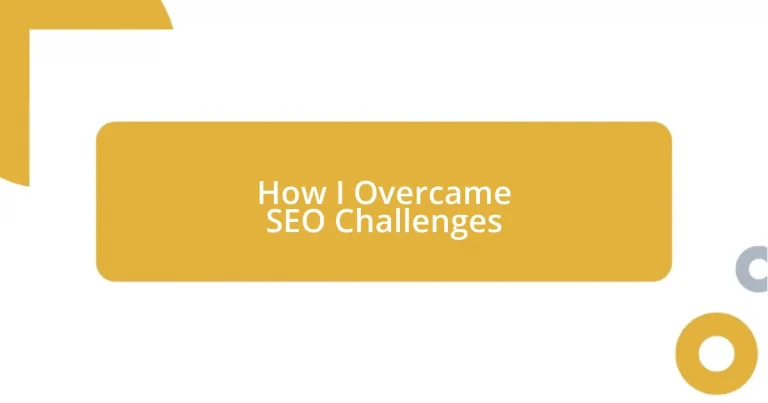Key takeaways:
- Understanding SEO fundamentals emphasizes the importance of creating valuable content over keyword stuffing.
- Adapting to Google’s algorithm changes and mastering analytics are crucial for navigating SEO challenges and shaping effective strategies.
- Learning from failures can lead to resilience and better audience understanding, shifting focus towards what truly resonates with readers.
- Celebrating both small and significant successes reinforces motivation and acknowledges the human impact of SEO efforts.
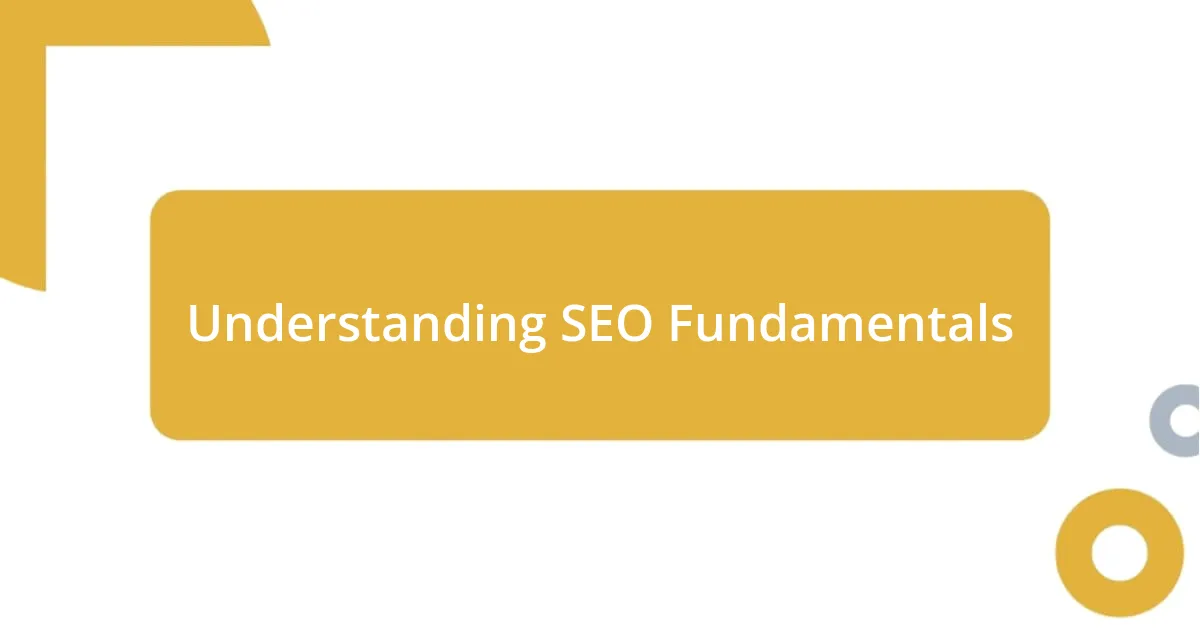
Understanding SEO Fundamentals
Understanding the fundamentals of SEO is a game changer for anyone looking to improve their website’s visibility. When I first began my journey, I remember grappling with the sheer volume of terms like “backlinks” and “meta tags.” These concepts initially felt overwhelming, but diving into each one revealed their crucial role in driving organic traffic.
One of the key principles is that SEO isn’t just about keyword stuffing; it’s about creating valuable content that resonates with your audience. I once wrote a blog post packed with keywords but saw little engagement until I shifted my focus to truly understanding what my readers were seeking. Have you ever felt like you were missing the mark with your audience despite your best efforts? That realization sparked a change in my approach, making me prioritize value over volume.
Links are also essential. I learned early on that building relationships with other creators can significantly boost your site’s authority. It’s not just about the numbers; it’s about genuine connections. I’ve experienced firsthand how a simple mention from a respected site can bring a flood of new visitors—and it’s exhilarating! Isn’t it fascinating how collaboration can amplify our voices in this vast digital landscape? Each of these elements of SEO intertwines, painting a fuller picture of why a strategic approach is key to online success.
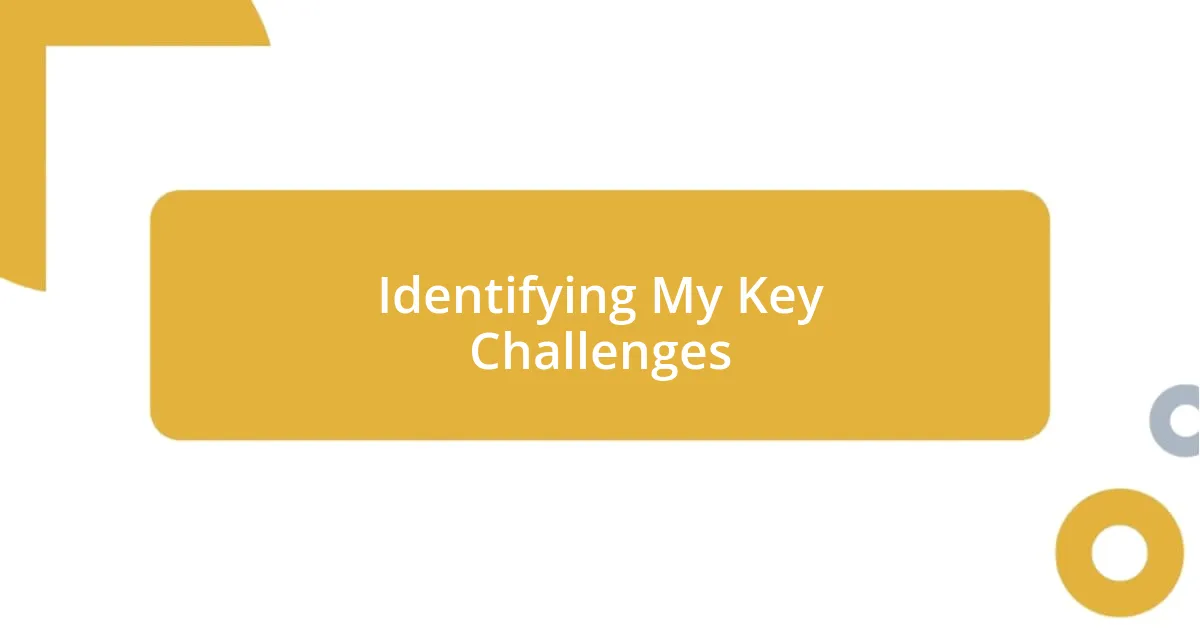
Identifying My Key Challenges
Identifying the key challenges I faced in SEO was a crucial step for me. Initially, it was like trying to find my way through a dense fog. I distinctly remember staring at analytics reports, confused by the numbers, unsure of what they meant for my strategy. Did they signify success or point to missed opportunities? This uncertainty made me realize how vital it is to comprehend these metrics fully.
Another significant challenge was adapting to Google’s ever-changing algorithms. I often found myself anxious after hearing about major updates. I recall one moment when an update drastically affected my rankings. It felt like I had built my success on shifting sands. I understood then that staying informed and flexible was key to navigating these turbulent waters.
Lastly, my struggle with content optimization stood out starkly. I had written quality posts, but without the right SEO practices, they didn’t perform well. I can remember the frustration of pouring my heart into an article only to have it lost in the depths of search results. This made me realize the importance of content optimization—and that good writing alone simply isn’t enough.
| Challenge | Key Insight |
|---|---|
| Understanding Analytics | Metrics need to be interpreted for a clear strategy. |
| Adapting to Algorithm Changes | Staying informed and flexible is crucial. |
| Content Optimization | Quality writing must pair with SEO best practices. |
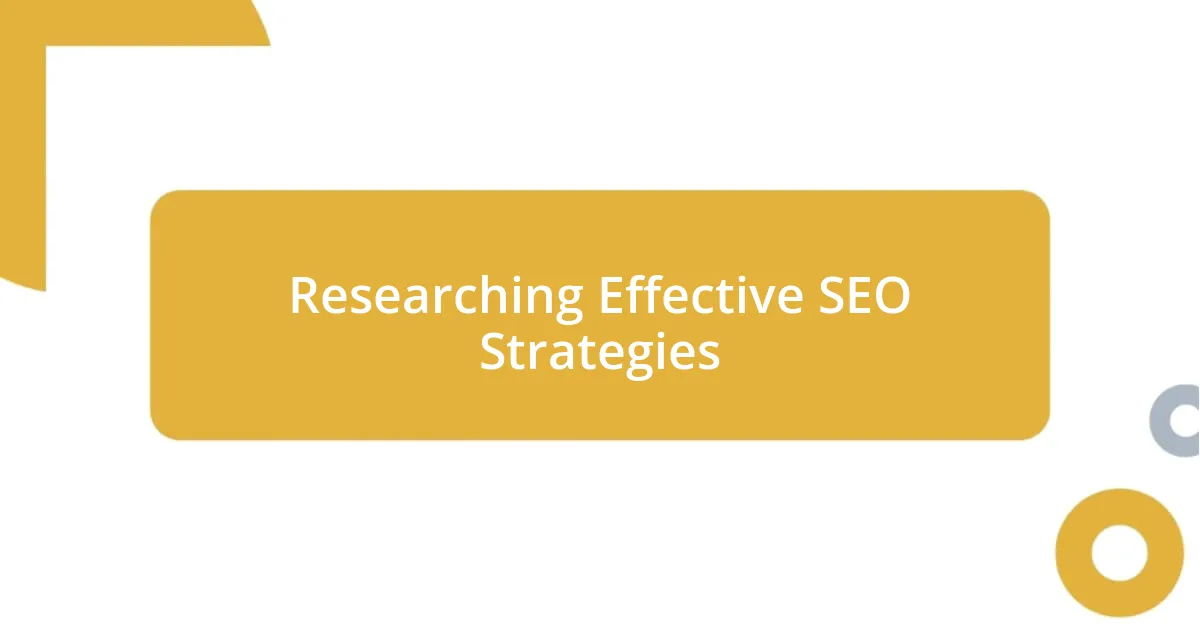
Researching Effective SEO Strategies
Researching effective SEO strategies transformed my approach, leading to meaningful improvements. Early on, I often relied on generic advice found in forums or outdated articles. However, I soon realized that diving into my niche’s specifics was essential. It was like finding hidden treasures that resonated more closely with my audience’s needs. When I rolled up my sleeves and began analyzing the current trends and successful campaigns, the insights I gained felt empowering. I remember one particular evening spent dissecting competitor strategies—it was almost a lightbulb moment for me!
To streamline the process of researching effective SEO strategies, here are some steps that helped me tremendously:
- Analyze Competitors: Study top competitors in your niche to identify their keyword use, content topics, and link-building tactics.
- Leverage SEO Tools: I invested in tools like SEMrush and Ahrefs, which gave me detailed insights into keyword difficulty and search volume.
- Stay Current: Following reputable SEO blogs and forums kept me updated on the latest tips and algorithm changes.
- Engage with Your Audience: I found that customer feedback provided invaluable direction. Understanding their questions and concerns shaped my content effectively.
- Experiment and Monitor: Testing various strategies, like different content formats, while keeping a close eye on analytics helped me refine my approach continuously.
Combining these strategies not only mitigated my initial confusion but also fostered a sense of empowerment in my SEO journey. It’s incredible how informed research can dispel those doubts and lead you toward success!
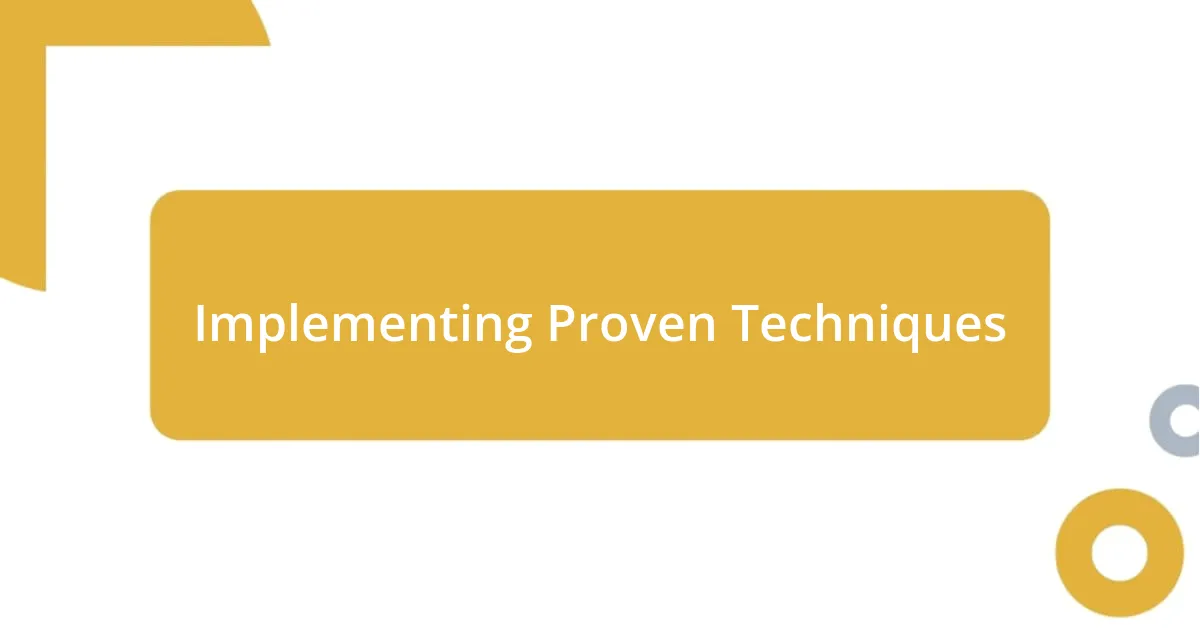
Implementing Proven Techniques
Implementing proven techniques was a game-changer for me. At first, I felt overwhelmed by the sheer volume of information out there. I remember when I decided to focus on on-page optimization. It seemed daunting at first, but once I started placing strategic keywords in titles and headers, the difference in my traffic felt like a breath of fresh air. I began to wonder, “Why didn’t I do this sooner?”
One technique that stood out was the importance of creating high-quality backlinks. I made it my mission to reach out to industry influencers and request guest post opportunities. I still recall the excitement of receiving my first positive response. That not only built my credibility but also allowed me to tap into their audience. Establishing these connections became pivotal; I learned that collaboration often trumps competition.
Also, embracing local SEO shifted my traffic patterns dramatically. I discovered that optimizing for local searches could open doors I hadn’t even considered. It was refreshing to witness how my business visibility increased when I ensured my Google My Business profile was complete and actively engaged with customer reviews. That proactive approach made me ponder the local community’s needs, aligning my strategies with genuine engagement rather than just numbers. What I learned through these techniques is that SEO is not just about pixels and algorithms; it’s about understanding your audience and connecting with them on a deeper level.
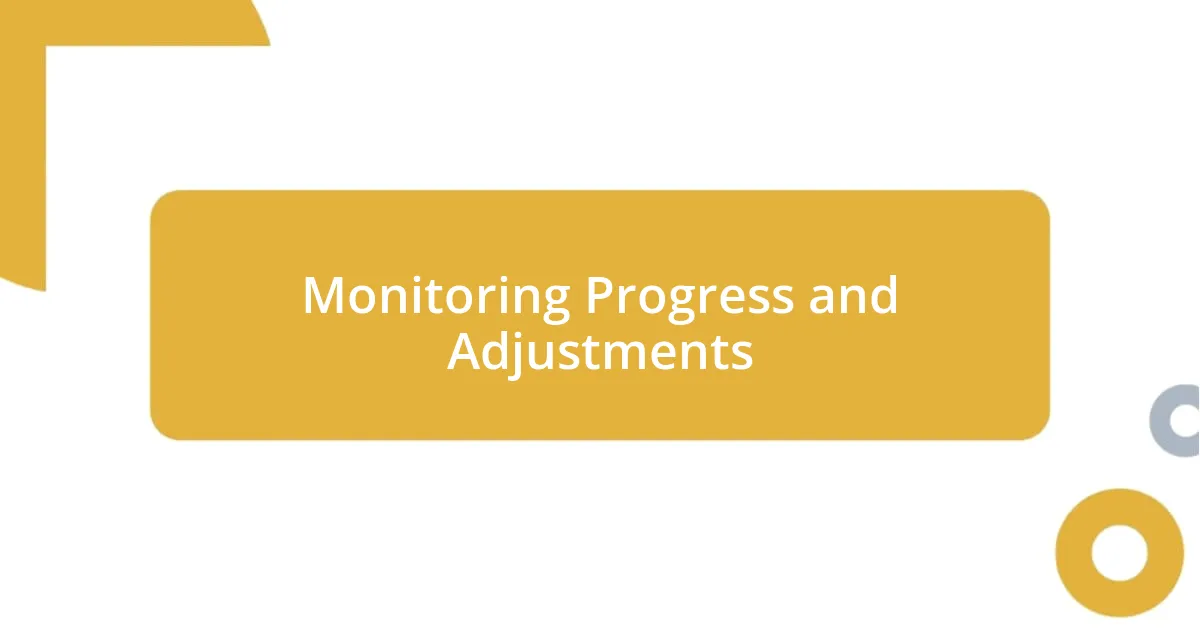
Monitoring Progress and Adjustments
Tracking progress was essential in my SEO journey. I distinctly remember the first time I checked my analytics after implementing some new strategies. The numbers were alive; they told a story of growth that made me feel like I was on the right path. I realized then that monitoring isn’t just about numbers; it’s about seeing how your efforts resonate with your audience.
Adjustments became a natural part of my routine. A month after launching a new content piece, I noticed the bounce rate was higher than I’d liked. Initially, it was disheartening, but instead of feeling defeated, I took it as a challenge. I started revisiting the content, tweaking headlines, and including more engaging visuals. The follow-up analytics showed a significant drop in the bounce rate, making me reflect on the importance of continuous improvement in SEO.
There were moments when I felt stuck, as if I’d hit a wall. But those were also the moments that led to breakthroughs. I’ve learned that the SEO landscape is ever-changing, so being flexible and responsive is crucial. When I began asking myself questions like, “What would my audience really find valuable?” and “How can I improve this content further?” the insights I gained drove me to make the adjustments that mattered most. It’s a journey that requires patience and persistence, but it’s so rewarding when you start seeing those changes pay off.
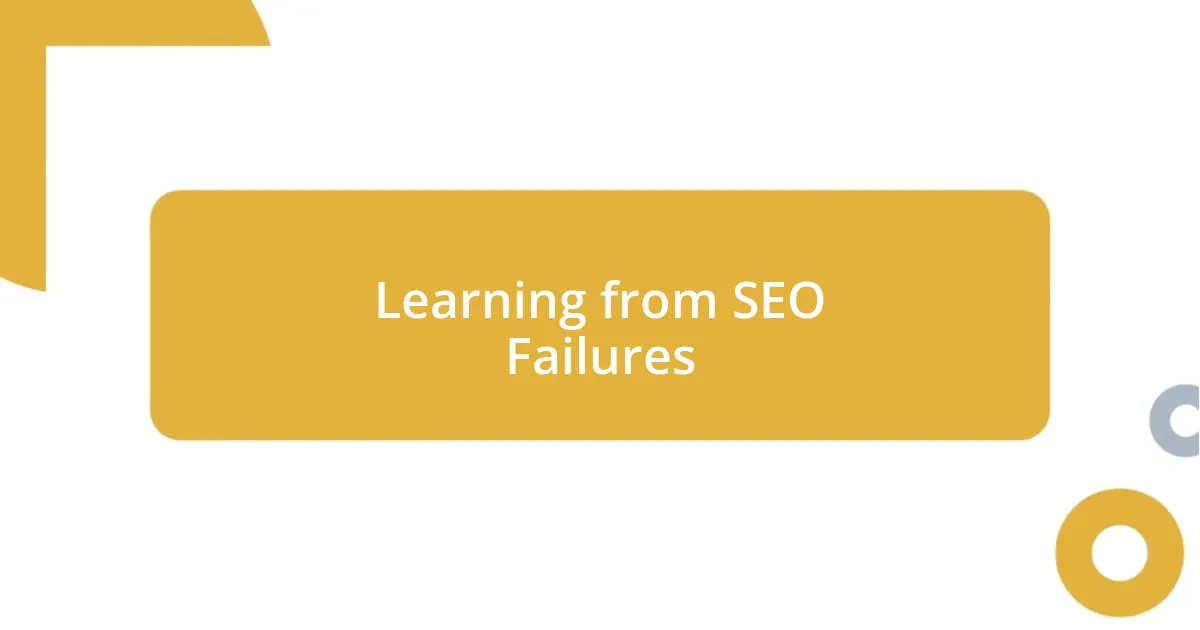
Learning from SEO Failures
Learning from SEO failures can often yield some of the most valuable lessons. I remember a time when I launched a campaign filled with enthusiasm, only to see dismal results. Initially, I felt defeated, but that setback sparked curiosity. Why had my content failed to connect? As I analyzed the keywords I chose, I realized I had overlooked user intent. This experience taught me not just to focus on what I thought was important, but to truly understand what my audience was searching for.
In another instance, I invested considerable time in optimizing a lengthy blog post, convinced it would perform well. But to my dismay, it barely gained traction. Frustration washed over me as I faced the reality that more content doesn’t always mean better results. I began asking myself, “What resonates with my readers?” So, I decided to pivot towards shorter, more succinct pieces that provided rapid value. The positive feedback from my readers reaffirmed that sometimes, less truly is more in the world of SEO.
Through these failures, I discovered the importance of resilience. Instead of viewing setbacks as dead ends, I learned to see them as stepping stones. Each failure was simply data, showing me what didn’t work and guiding me towards what might. I often reflect, “Am I willing to embrace these challenges?” I’ve found that when you shift your mindset from fear to curiosity, the learning truly begins, leading to profound growth in your SEO journey.
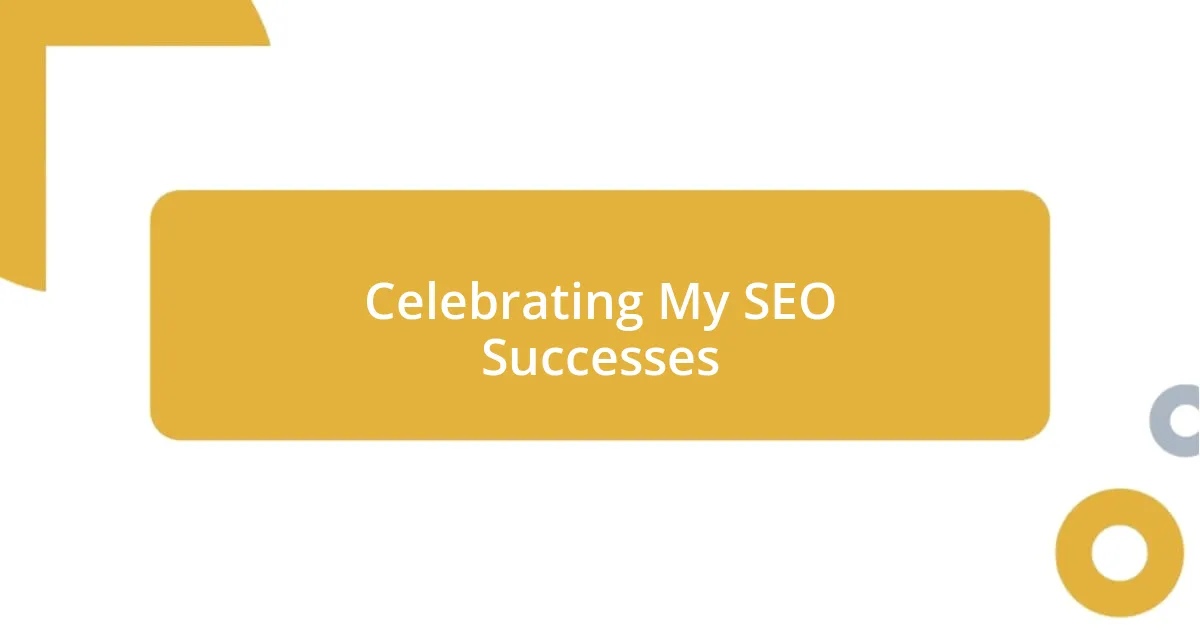
Celebrating My SEO Successes
I’ll never forget the rush I felt when one of my targeted keywords finally hit the top spot in search results. It wasn’t just about the ranking; it was a recognition of all the late nights I spent optimizing articles and researching trends. That moment confirmed my belief that persistence, coupled with strategic moves, creates real impact. Isn’t it invigorating when hard work pays off?
Celebrating smaller wins has also been pivotal for me. I distinctly remember when the organic traffic to my site increased by 50% in a month after optimizing just three blog posts. I started sharing these milestones with my team, and it became a motivational source for everyone. It highlighted how every tweak and update collectively contributes to building momentum. Have you ever paused to celebrate your progress, even if it seems minor? It’s those moments that keep the spirit alive and remind us why we started.
I also cherish the feedback I received from readers who found my content genuinely helpful. There was one email that stood out—someone wrote to tell me how an article I published had saved them hours of research. That validation was exhilarating! It’s easy to get caught up in metrics and algorithms, but knowing I made a difference for someone is truly what drives me. How often do we reflect on the human element behind our work? Celebrating these connections enriches my SEO journey beyond just numbers.
